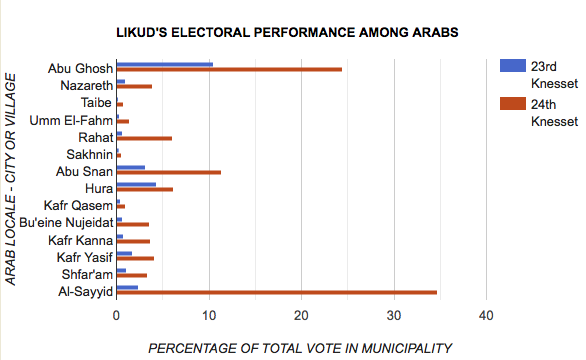FRESH AIR
Surprise: Likud drew more Israeli Arab votes than ever
April 1, 2021 | Ahron Shapiro


One of the remarkable stories of the March 23 Israeli election is the Likud achieving a historically high percentage of Arab votes. According to voting data publicly available online (in Hebrew), in one Arab city, the Likud soared close to 10x higher than in past elections. In one smaller Arab village, it skyrocketed by well over one thousand percent. In most areas, Arab vote for the Likud at least doubled compared to the last election, held just a year ago.
in the Negev Bedouin village of Al-Sayyid, the Likud vote increased from 21 votes representing 2.39% of the vote in the last election to 279 votes, or 34.70% – an increase of 1,352% for the party. This makes it the second largest party in the village, dwarfing the Joint List, which received 75 votes, or 9.33%. Only the Arab Ra’am party got more.
The Likud performed exceptionally well among Negev Bedouin, in cities like Rahat, where the Likud increased its vote percentage by 896% (From 0.61% to 6.08%). Yet the party also did better in Arab locales all over the country, in places like the Galilean town of Abu Snan (from 3.15% to 11.38%), the city of Nazareth (from 1% to 3.91%), and the city of Umm El-Fahm in the Wadi Ara triangle (0.29% to 1.44%).
You can find more town-by-town detail about the Likud’s performance in the Arab community in a thread I posted on Twitter on March 26.
Trying to find a single Arab town or village anywhere in Israel where the Likud garnered fewer votes than in the last round was difficult – in fact, I gave up after sifting through data for close to 20 of them. My research took me back four elections for every town and village I looked into, and while the Likud had fluctuated somewhat in some villages from election to election, the Likud’s performance in the latest election was, in all cases, a historical zenith by a huge margin.
It’s true that Likud party leader Binyamin Netanyahu had made a special effort to attract Arab votes in this election, with billboards, community visits and campaign promises such as working towards direct flights from Israel to Mecca. Yet the party’s achievement remains counter-intuitive given that Arab turnout was down overall and the Likud had controversially signed a vote sharing pact with Bezalel Smotrich’s far-right Religious Zionist party ahead of the election.
Polling and anecdotal evidence before the election had shown Israeli Arabs increasingly want to vote for parties with influence – regardless of where they stand politically – as Ha’aretz journalist Jack Khoury reported back in February (registration required).
Khoury wrote:
Ibrahim al-Sayyid, from the Negev village of Al-Sayyid, vows that Likud will get several hundred votes in the next election. “I’ve been active in several parties in the past, including the United Arab List, Meretz and the Labor Party,” Sayyid said. “Now I’ve turned to the right. People are sick of parties with little or no influence so they’re going to try the parties in power, such as Likud.”
Actually – in his vicinity alone, Al-Sayyid claims to have has recruited thousands of people prepared to vote Likud on March 23. Asked about ideological issues such as the so-called nation-state law, which many Israeli Arabs view as reducing them to second-class citizens, or practical matters such as Israel demolishing homes in unrecognized Bedouin communities in the south, he remains adamant. Asked if voting left-wing might not be preferable: “On the contrary,” he said. “Maybe now with our support, we can gain influence from the inside. It’s clear that Likud will be in the government, so what’s better? Being in the game or on the outside? We want to have influence.”
Shortly after Khoury’s article was published, the Moshe Dayan Center for Middle Eastern and African Studies published a survey of the Israeli Arab community that predicted the Likud’s electoral improvement and also showed nearly half of the Arab voters (46%) supporting the participation of an Arab party in any government that forms after the elections, presumably including one led by Likud.
Conclusion
Has the Likud’s success marked some sort of major shift in attitudes among the Israeli Arab community towards Zionist parties? The results from this election alone does not provide enough data to reach that conclusion. To be clear, with few exceptions, the Likud’s performance in Arab localities trailed either the Arab-dominated Joint List or Ra’am parties by a huge margin. In a majority of Arab locales, the Likud was unable to draw more than a token number of votes – sometimes less than one or two percent, even after the improvement.
Yet there is no disputing that the Likud’s performance was competitive with other Zionist parties in most Arab cities, matching or exceeding the vote totals for parties like Meretz, Labor, Blue and White and Yesh Atid, not only in this election but in the three prior elections as well.
As such, it’s a development that challenges assumptions of the kind of parties Israeli Arabs are prepared to vote for, and why. It’s one more sign of a larger ongoing story about the changing relationship of Israel’s Arab minority with Israeli society as a whole.
Photo credit: Likud’s Facebook page
RELATED ARTICLES

US Middle East strategy amid regional instability: Dana Stroul at the Sydney Institute

Antisemitism in Australia after the Bondi Massacre: Arsen Ostrovsky at the Sydney Institute





















